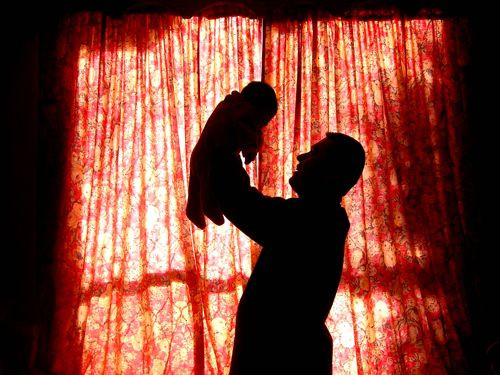Absent Fathers Have Bigger Testicles: Size Matters With Male Parenting?

Size does matter when it comes to being a nurturing father. New evidence from Emory University shows that men with smaller testes are more likely to be involved with the hands-on care of their toddlers.
The main goal of the project was to determine why some fathers invest less time in parenting than others. Socioeconomic factors, like education, income, and social skills are obvious factors, but the Emory scientists wondered if there is a deeper, biological underpinning.
"Our study is the first to investigate whether human anatomy and brain function explain this variance in parenting effort," said first author Dr. Jennifer Mascaro, an anthroplogist and neuroscientist, whose findings were reported today in PNAS.
Seventy biological fathers, with newborns between the ages of 1 and 2, were recruited for Mascaro’s study. All of the dads were living with children and their biological mothers during the time of the study. Both parents were interviewed and asked questions about the father’s involvement in hands-on childcare, like how often they change diapers, bathe the child, or take the infant, when sick, to the doctor.
The researchers started by measuring levels of testosterone, the male sex hormone. Prior work has shown that lower levels of the male sex hormone testosterone are correlated with greater paternal involvement. In contrast, higher levels of testosterone predict divorce and infidelity.
Male nuturing had a modest, but significant, correlation with testosterone levels, with less hormone being associated with better care giving. Testosterone is produced by testes, and the researchers found men with smaller ‘cajones’ were more hands-on with their children.
A father’s testes volume was also corresponded with brain acitivity in the ventral tegmental area (VTA), which governs reward and parental motivation.
"The men with smaller testes were activating this brain region to a greater extent when looking at photos of their own child," Mascaro continued.
But it remains to be known if smaller testes lead to better fathers or if being a more nuturing father shrinks one’s gonads.
"We're assuming that testes size drives how involved the fathers are," said Emory anthropologist Dr. James Rilling, whose lab led the study, "but it could also be that when men become more involved as caregivers, their testes shrink. Environmental influences can change biology. We know, for instance, that testosterone levels go down when men become involved fathers."
Future studies could explore just how testosterone impacts the emotional cognition toward children and vice versa. It’s possible that as fathers spend more time with their children, their cerebral pathways that govern feelings of rewards change, which leads to a subsequent hormonal shift. Long-term investigations may, one day, reveal the biological traits that make good fathers.
"The fact that we found this variance suggests personal choice," Rilling continued. "Even though some men may be built differently, perhaps they are willing themselves to be more hands-on fathers. It might be more challenging for some men to do these kinds of caregiving activities, but that by no means excuses them."
"Our data suggest that the biology of human males reflects a trade-off between investments in mating versus parenting effort," Rilling concluded
Source: Mascaro JS, Hackett PD, Rilling JK. Testicular volume is inversely correlated with nurturing-related brain activity in human fathers. PNAS. 2013.



























